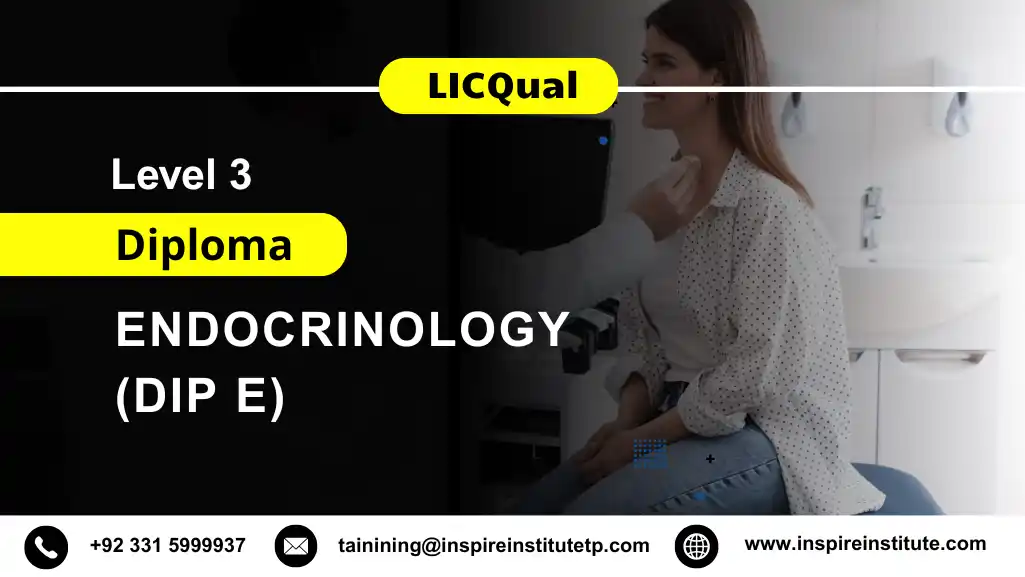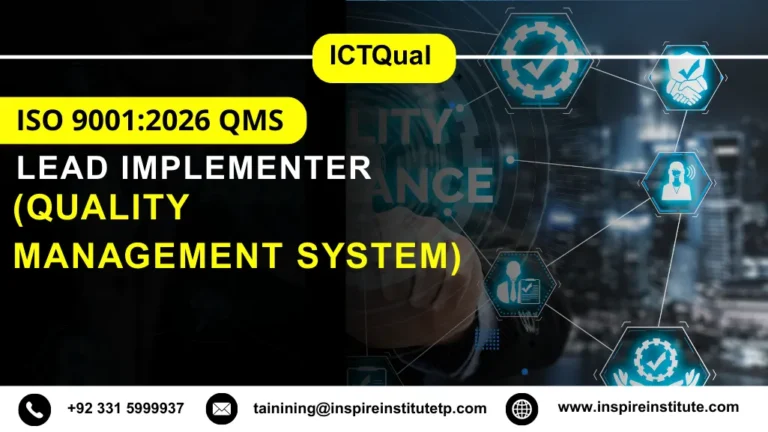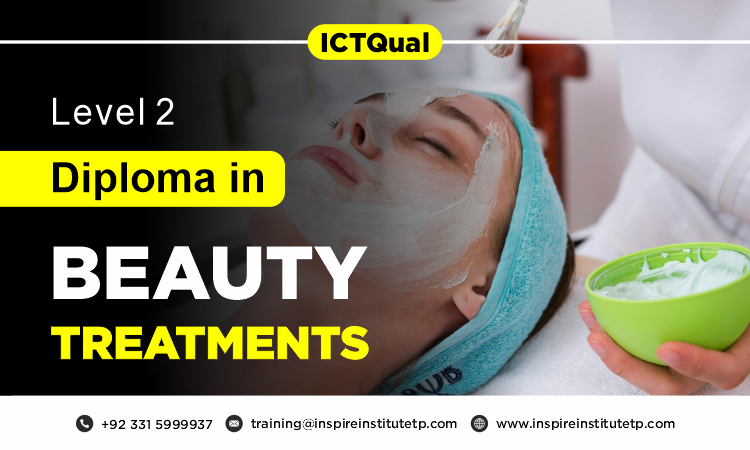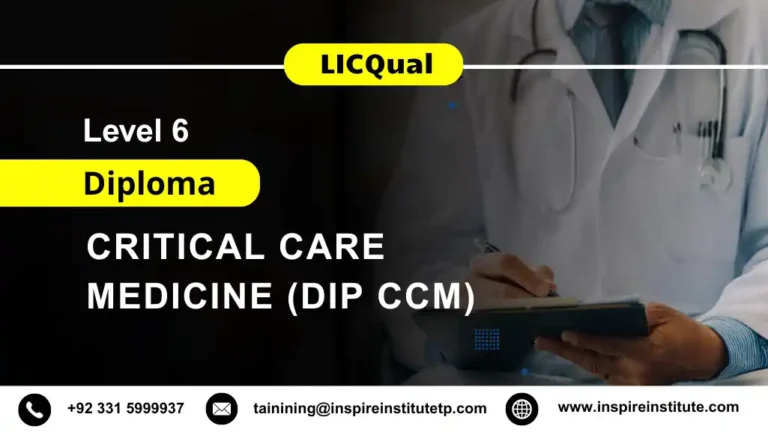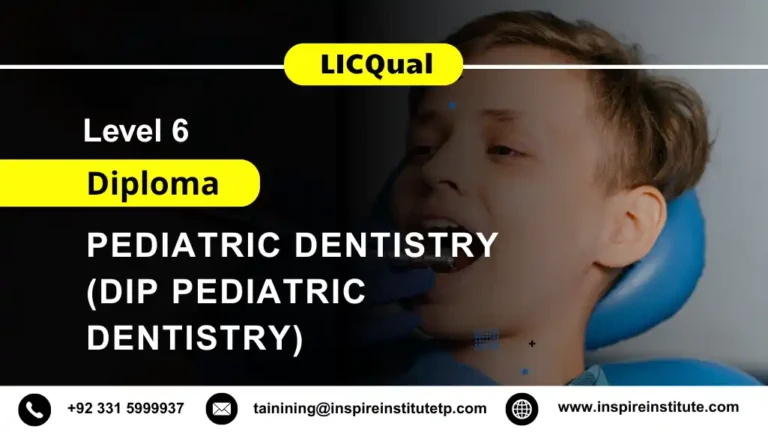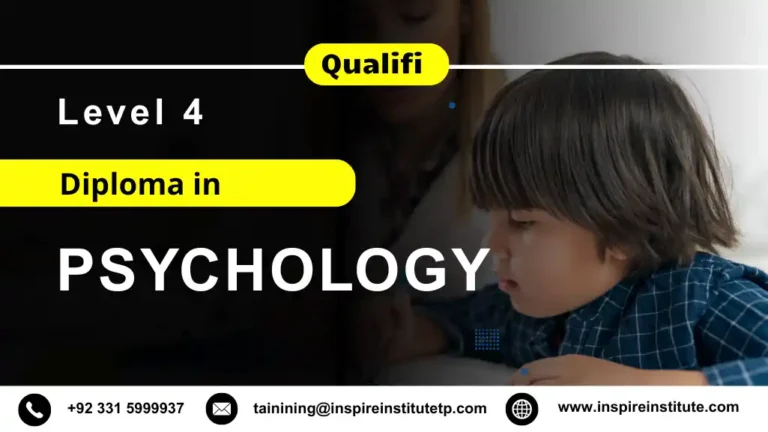LICQual Level 3 Diploma in Endocrinology (Dip E)
The LICQual Level 3 Diploma in Endocrinology (Dip E) is a UK-accredited qualification designed to equip healthcare professionals, nurses, medical assistants, and aspiring clinicians with specialised knowledge in hormone regulation, endocrine system function, and the management of endocrine disorders. As endocrine conditions such as diabetes, thyroid dysfunction, and adrenal disorders continue to rise globally, expertise in endocrinology has become essential for effective patient care. This assignment-based programme combines theoretical knowledge with practical applications, preparing learners to deliver evidence-based endocrine healthcare across hospitals, clinics, and community health settings.
This diploma provides a comprehensive understanding of the endocrine system, covering gland function, hormone synthesis, and regulatory mechanisms. Learners explore a wide spectrum of endocrine disorders, including diabetes mellitus, hypothyroidism, hyperthyroidism, adrenal insufficiency, and reproductive endocrine conditions. The course Endocrinology emphasises the pathophysiology, diagnosis, and management of these conditions, enabling learners to make informed, clinical decisions in endocrine care.
Practical application is a core focus of the programme, with learners developing essential skills in patient assessment, hormone level interpretation, and monitoring endocrine therapy. The course equips graduates to support diabetes management plans, administer hormone replacement therapies, and provide patient education for lifestyle and preventive care. These skills ensure that learners can apply theory effectively in real-world healthcare environments, including hospitals, outpatient clinics, and specialised endocrine units.
By completing this qualification, learners earn a UK-recognised diploma that validates their advanced knowledge and competence in endocrinology. This recognition enhances professional credibility and aligns with international healthcare standards, increasing career prospects in hospitals, research institutions, public health organisations, and private endocrine clinics. The diploma also serves as a foundation for further advanced studies in medicine, nursing, or endocrine research.
The assignment-based, flexible learning pathway allows learners to balance professional or personal commitments with academic progression. Learners benefit from structured modules, self-paced study, and guidance from experienced instructors, ensuring mastery of both theoretical concepts and clinical practice. Evidence-based training emphasises adherence to global guidelines in endocrine healthcare, supporting safe, effective, and patient-centred care.
Graduates of the LICQual Level 3 Diploma in Endocrinology (Dip E) are prepared for diverse roles, including endocrine care assistants, clinical support specialists, diabetes educators, and allied healthcare professionals. The programme also strengthens communication, ethical decision-making, and interdisciplinary collaboration skills, fostering professional growth and enhancing patient care delivery. By combining academic excellence with practical competence, this diploma empowers learners to contribute meaningfully to global endocrine health outcomes.
Why Choose this Qualification
The LICQual Level 3 Diploma in Endocrinology (Dip E) is a UK-accredited qualification that equips learners with specialised knowledge and practical skills in endocrine health, hormone regulation, and the management of endocrine disorders. With the rising prevalence of conditions such as diabetes, thyroid disorders, and adrenal imbalances, healthcare professionals with expertise in endocrinology are in high demand. This diploma combines theoretical foundations with real-world applications, ensuring learners gain competency in delivering effective, evidence-based endocrine care. The following highlights the key reasons to choose this qualification.
Key Reasons to Choose this Qualification
Specialist Knowledge
- Develop a deep understanding of the endocrine system, including glandular functions and hormone regulation.
- Gain insights into the pathophysiology, diagnosis, and treatment of endocrine disorders such as diabetes, hypothyroidism, and adrenal insufficiency.
- Learn the mechanisms of hormone therapies, replacement treatments, and preventive care strategies.
- Understand the impact of lifestyle, nutrition, and environmental factors on endocrine health.
- Build competency in evidence-based decision-making for endocrine patient management.
Practical Application
- Acquire hands-on skills in assessing patients’ hormone levels and interpreting laboratory results.
- Learn to design and monitor treatment plans for endocrine disorders, including diabetes management and thyroid therapy.
- Apply knowledge in hospitals, clinics, and community healthcare settings.
- Develop patient education strategies for long-term endocrine health management.
- Gain confidence in managing clinical emergencies related to endocrine dysfunctions.
Recognised Qualification
- Earn a UK-recognised diploma that enhances professional credibility.
- Aligns with international healthcare standards in endocrine medicine.
- Provides validation for advanced knowledge and clinical competence.
- Supports eligibility for employment in hospitals, endocrine clinics, and research institutions.
- Offers a strong foundation for further specialised study or career advancement.
Flexible Learning Pathway
- Study through an assignment-based programme that fits around professional or personal commitments.
- Progress at a self-paced schedule while receiving expert guidance.
- Access comprehensive digital learning resources for effective study.
- Balance academic advancement with career responsibilities.
- Benefit from a programme designed for both full-time professionals and career changers.
Evidence-Based Training
- Engage with the latest research and international guidelines in endocrinology.
- Adopt patient-centred, safe, and effective treatment approaches.
- Strengthen clinical reasoning and data interpretation skills.
- Understand emerging trends and therapies in endocrine healthcare.
- Ensure interventions meet ethical and professional standards.
Career Development
- Open pathways to roles such as endocrine care assistant, diabetes educator, or clinical support specialist.
- Enhance employability in hospitals, clinics, research facilities, and public health organisations.
- Prepare for progression to advanced studies in medicine, nursing, or endocrinology.
- Expand skills in patient management, clinical documentation, and health promotion.
- Gain recognition for specialised endocrine expertise in global healthcare.
Enhanced Patient Care Delivery
- Contribute to improved patient outcomes through early detection and effective management of endocrine disorders.
- Promote patient education, lifestyle modifications, and preventive care.
- Support interdisciplinary teams in delivering comprehensive endocrine healthcare.
- Provide compassionate, patient-centred care across clinical and community settings.
- Strengthen ability to manage complex endocrine cases with confidence.
Professional Growth
- Enhance communication, teamwork, and clinical decision-making skills.
- Foster ethical awareness and professional responsibility in patient care.
- Develop resilience and empathy required for managing sensitive healthcare scenarios.
- Gain skills applicable to multidisciplinary healthcare teams.
- Build a strong foundation for leadership roles in endocrine and general healthcare.
The LICQual Level 3 Diploma in Endocrinology (Dip E) equips learners with essential theoretical knowledge, practical competence, and a UK-recognised qualification. By completing this programme, healthcare professionals are empowered to deliver high-quality endocrine care, advance their careers, and contribute meaningfully to global health outcomes in endocrinology.
Course Overview
LICQual UK Awarding Body
Average Completion Time:
4-12 Months
Study Units: 6 Units
Evidence & Assignment Based
Mandatory Units
Who Should Take This Course
The LICQual Level 3 Diploma in Endocrinology (Dip E) is a UK-accredited programme designed for healthcare professionals, medical assistants, nurses, and aspiring clinicians who wish to specialise in endocrine health and the management of hormone-related disorders. This assignment-based qualification integrates theoretical knowledge with practical applications, preparing learners to provide high-quality, evidence-based care in endocrine and metabolic health settings. The course is suitable for a wide range of learners seeking to enhance their clinical knowledge, improve patient outcomes, and advance their careers in healthcare.
This course is suitable for
Healthcare Professionals
- Nurses, clinical support workers, and allied healthcare staff seeking specialised knowledge in endocrinology.
- Professionals aiming to enhance patient care through evidence-based endocrine practice.
- Individuals looking to develop competency in managing hormone-related conditions such as diabetes, thyroid disorders, and adrenal dysfunction.
- Healthcare staff requiring updated knowledge of endocrine system pathophysiology and treatment protocols.
- Practitioners aiming to strengthen clinical decision-making and patient management skills in endocrine care.
Medical Assistants and Technicians
- Medical assistants working in hospitals, clinics, or endocrine units who want to expand their knowledge of hormone regulation.
- Laboratory technicians responsible for hormone testing, patient monitoring, and diagnostic interpretation.
- Professionals involved in supporting diabetes care, thyroid management, or adrenal therapy.
- Individuals seeking practical skills for patient assessment and treatment monitoring.
- Assistants aiming to integrate theoretical knowledge into real-world endocrine practice.
Aspiring Clinicians
- Students in medicine, nursing, or allied health planning a career in endocrinology or metabolic medicine.
- Learners who wish to gain a strong foundation in hormone-related physiology and disorders.
- Individuals preparing for specialised clinical placements or research roles in endocrine health.
- Students aiming to combine academic learning with practical skills for patient-centred care.
- Future clinicians seeking globally recognised qualifications to enhance employability.
Career Changers in Healthcare
- Professionals transitioning from general healthcare roles to endocrine or metabolic care.
- Individuals seeking structured learning to build specialised knowledge in hormone disorders.
- Career changers aiming to gain UK-accredited credentials recognised internationally.
- Learners looking for flexible, assignment-based study that accommodates current work commitments.
- Professionals targeting opportunities in hospitals, clinics, research, or community healthcare.
Community Health Practitioners
- Staff involved in patient education, preventive care, and chronic disease management in the community.
- Professionals aiming to improve public awareness of diabetes, thyroid health, and other endocrine disorders.
- Individuals supporting patient lifestyle modifications, monitoring, and long-term care.
- Practitioners focusing on early diagnosis and referral for complex endocrine conditions.
- Healthcare workers seeking to integrate endocrine expertise into community health programs.
Research and Academic Aspirants
- Learners preparing for roles in clinical research, public health, or academic teaching in endocrinology.
- Individuals seeking knowledge of evidence-based endocrine practices for research purposes.
- Students planning further advanced studies or postgraduate training in endocrine medicine.
- Learners aiming to contribute to the development of clinical guidelines and best practices.
- Aspiring researchers looking for a UK-recognised qualification as a foundation for academic careers.
International Healthcare Professionals
- Overseas clinicians and healthcare staff seeking a globally recognised UK qualification in endocrinology.
- Professionals aiming to meet international standards in hormone disorder management.
- Individuals wanting to improve career prospects in hospitals, research centres, or NGOs worldwide.
- Learners seeking flexible, assignment-based learning suitable for working professionals.
- Healthcare staff aiming to apply theoretical and practical knowledge in diverse clinical environments.
The LICQual Level 3 Diploma in Endocrinology (Dip E) is ideal for healthcare professionals, students, and career changers who wish to gain advanced knowledge and practical expertise in endocrine health. By completing this programme, learners are equipped to provide effective, evidence-based care, enhance their professional credibility, and contribute to improved patient outcomes in endocrinology and metabolic medicine.
Course Benefits
The LICQual Level 3 Diploma in Endocrinology (Dip E) offers extensive benefits for learners aiming to build expertise in endocrine health, hormonal balance, and the management of endocrine and metabolic disorders. By integrating theoretical foundations with evidence-based practical applications, this UK-accredited qualification equips learners to assess, diagnose, and manage hormone-related conditions effectively. Designed as an assignment-based programme, it provides flexibility, academic excellence, and clinical relevance, supporting professional development for healthcare practitioners, nurses, and aspiring clinicians in this specialised field.
Key Benefits of the Course:
- Specialist Knowledge:
Gain an in-depth understanding of endocrine anatomy, physiology, and the mechanisms underlying hormonal disorders such as diabetes, thyroid dysfunction, adrenal insufficiency, and reproductive hormone imbalances. Learners explore diagnostic protocols, hormone therapy, and the impact of lifestyle and environmental factors on endocrine health. This knowledge enables graduates to make evidence-based clinical decisions and provide high-quality endocrine care. - Practical Application:
Develop essential clinical skills in hormone assessment, interpreting laboratory results, and supporting endocrine treatment plans. Learners gain practical competence in patient monitoring, medication management, lifestyle intervention, and patient education. The course ensures graduates can apply theory effectively within hospitals, endocrine clinics, outpatient services, and community healthcare programmes. - Recognised Qualification:
Earn a UK-recognised diploma that validates advanced knowledge and practical skills in endocrinology. This internationally recognised qualification enhances professional credibility and career prospects, aligning with global healthcare standards. Graduates can pursue employment in hospitals, research centres, clinics, and public health organisations, reflecting the course’s recognition and value worldwide. - Flexible Learning Pathway:
Delivered through an assignment-based format, the programme allows learners to balance professional or personal responsibilities while advancing academically. This flexibility is ideal for healthcare assistants, nurses, medical students, and career changers seeking structured yet accessible training in endocrine and metabolic medicine. - Evidence-Based Training:
The course integrates current research, clinical guidelines, and best practices in endocrinology. Learners engage with evidence-based approaches to patient care, including hormone replacement therapy, chronic disease management, and preventive endocrine health strategies. This ensures graduates adopt safe, effective, and ethical care practices. - Career Development:
This qualification opens diverse career opportunities in hospitals, clinics, research facilities, endocrine units, and public health organisations. Graduates can pursue roles such as endocrine support specialist, diabetes educator, hormone therapy assistant, or progress to advanced studies in medicine, nursing, or clinical research. - Enhanced Patient Care Delivery:
Learners develop the expertise to provide patient-centred endocrine care through accurate assessment, treatment planning, and monitoring. Graduates are equipped to support chronic disease management, educate patients, and improve overall health outcomes, contributing meaningfully to public health and community wellness. - Professional Growth:
The programme strengthens clinical reasoning, communication, and teamwork skills essential for effective healthcare delivery. Learners cultivate professionalism, ethical awareness, and critical thinking, preparing them to become confident, compassionate, and competent endocrine care practitioners.
The LICQual Level 3 Diploma in Endocrinology (Dip E) empowers learners with the knowledge, practical skills, and UK-recognised qualification needed to excel in endocrine healthcare. By combining rigorous academic learning with real-world applications, it prepares healthcare professionals and aspiring practitioners to improve patient outcomes, advance their careers, and contribute to global endocrine health initiatives. to advance their careers and play a vital role in promoting global respiratory health.
Eligibility Criteria
The LICQual Level 3 Diploma in Endocrinology (Dip E) is a UK-accredited qualification specifically designed for healthcare professionals, nurses, medical assistants, and individuals seeking to specialise in endocrine health and hormonal medicine. This assignment-based programme provides a comprehensive understanding of endocrine system function, hormonal regulation, and the clinical management of common and complex endocrine disorders. By combining theoretical knowledge with practical application, the course equips learners with the skills to deliver high-quality, evidence-based endocrine care. Learners who meet the entry requirements will be well-prepared to apply their expertise effectively in hospitals, endocrine clinics, community health centres, and specialised metabolic and hormonal care settings.
Educational Background:
Applicants should hold a recognised qualification in healthcare, nursing, medical sciences, or a related discipline. Candidates with Level 2 or Level 3 qualifications in healthcare practice, biology, physiology, or clinical sciences are encouraged to apply. Individuals with equivalent international qualifications will also be considered, provided their credentials meet the academic and professional standards of the programme. The diploma is particularly suitable for learners with an educational background in health sciences, nursing, or allied healthcare who wish to deepen their understanding and competence in endocrine medicine and metabolic health.
Professional Experience:
Previous professional experience in endocrine care, clinical healthcare, or nursing is beneficial but not mandatory. A minimum of one year’s experience in healthcare or a related field—such as nursing, caregiving, or medical assistance—is recommended. Applicants who have worked in hospitals, endocrine units, or community healthcare settings will find this qualification particularly valuable. Individuals without prior experience but with a strong interest in endocrinology are also encouraged to apply, as the course provides comprehensive foundational and practical training to build competence in this specialised field.
Age Requirement:
Learners must be at least 18 years old at the time of enrolment. This requirement ensures that learners possess the maturity, discipline, and professional responsibility necessary for studying endocrinology, which involves complex medical topics, ethical considerations, and patient-centred care. The programme demands commitment, analytical thinking, and clinical reasoning aligned with professional standards for adult healthcare education.
Language Proficiency:
As the LICQual Level 3 Diploma in Endocrinology (Dip E) is delivered and assessed in English, learners must demonstrate strong proficiency in reading, writing, and communication. Non-native English speakers are expected to hold an IELTS score of at least 6.0 or an equivalent qualification. This ensures learners can effectively engage with technical course materials, complete assignments, and communicate professionally with patients, healthcare colleagues, and academic mentors. Strong English proficiency also supports accurate documentation and the delivery of safe, patient-centred endocrine care.
Technical Requirements:
Applicants should have access to a personal computer or laptop with a reliable internet connection to participate fully in the online learning process. Basic IT literacy is essential, including familiarity with word processing software, digital research tools, and online learning platforms. Since this qualification is assignment-based, learners submit coursework electronically and engage in self-directed study using digital resources. The flexible online structure enables learners to manage their education alongside professional and personal responsibilities.
Required Documents:
To complete the registration process, applicants must provide a valid passport or national identification card for identity verification, along with proof of educational qualifications such as certificates or academic transcripts. Evidence of relevant professional or healthcare experience should also be submitted where applicable. International candidates may be required to submit certified translations of academic or professional documents to verify authenticity and eligibility. These requirements ensure all learners meet the academic, linguistic, and professional standards necessary for successful enrolment in the programme.
The Qualification Process
LICQual Level 3 Diploma in Endocrinology (Dip E)follows a structured pathway to ensure learners gain comprehensive knowledge, practical skills, and professional competence in community oral healthcare.
Step 1: Self-Assessment
Learners review the entry requirements to confirm eligibility. Candidates with a background in dentistry, oral health, or public health are encouraged to apply.
Step 2: Registration
Complete the registration process by submitting required documents such as proof of qualifications, a valid ID, and payment of enrollment fees.
Step 3: Induction
An induction session is conducted to:
- Verify learner eligibility and documentation.
- Introduce study materials, learning outcomes, and assessment procedures.
Step 4: Learning and Evidence Submission
Learners complete assignments, case studies, and practical exercises demonstrating competence in public health dentistry, community oral health assessment, preventive strategies, and program planning.
Step 5: Feedback and Revision
Assessors review submitted evidence and provide constructive feedback. Learners can revise and resubmit work to meet all required standards.
Step 6: Competence Validation
Final submissions are evaluated to confirm that learners have met all theoretical and practical learning outcomes.
Step 7: Internal Quality Assurance (IQA)
The IQA team reviews the assessment process to ensure accuracy, fairness, and compliance with international standards.
Step 8: External Verification (EQA)
External verifiers validate the authenticity and quality of learner achievements.
Step 9: Certification
Upon successful verification, learners are awarded LICQual Level 3 Diploma in Endocrinology (Dip E) , demonstrating advanced proficiency in community oral healthcare and preparing them for professional growth in dental public health, preventive dentistry, and healthcare policy.

